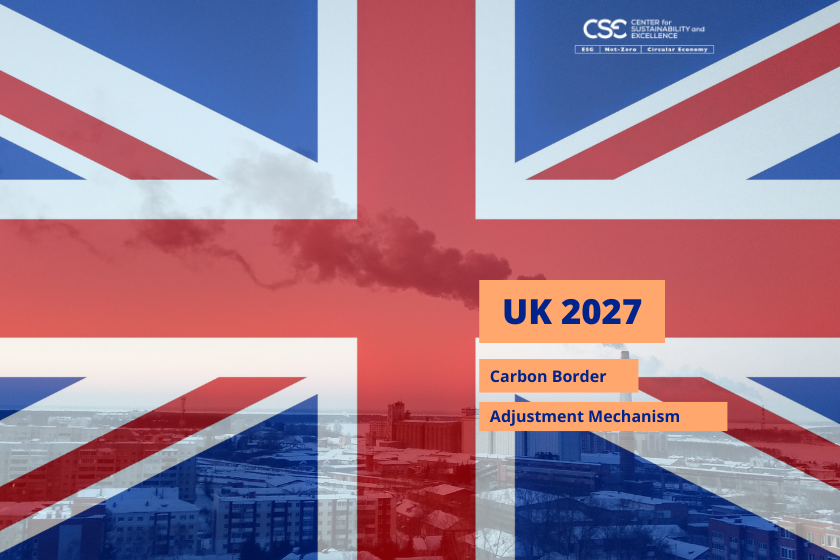The UK’s Carbon Border Adjustment Mechanism (CBAM), set to take effect on 1 January 2027, marks a pivotal development in global climate policy. Designed to combat carbon leakage and level the playing field between domestic and foreign producers, CBAM introduces a carbon price on imported goods from specific high-emission sectors. Find out below the most critical aspects of CBAM and the steps businesses and ESG managers should take to prepare.
What is CBAM and Why is it Important?
- A Global Shift in Climate Policy
CBAM reflects a growing trend among nations, including the EU, to extend domestic climate action to imported goods. This ensures that decarbonization efforts reduce global emissions rather than displacing carbon-intensive production to other countries. - Scope of CBAM
The UK CBAM will initially apply to imports from the aluminium, cement, fertilizers, hydrogen, iron, and steel sectors. These sectors are high-risk for carbon leakage and represent a significant share of global emissions. Notably, unlike the EU’s CBAM, the UK’s mechanism does not cover electricity imports and exempts the glass and ceramics sectors until further implementation issues are addressed. - How CBAM Works
The UK CBAM operates as a levy, calculated based on the emissions generated during the production of imported goods. Importers will pay a quarterly rate, reflecting the UK Emissions Trading Scheme (UK ETS) carbon price, adjusted for free allowances and carbon levies in the country of origin. Verification of actual or default emissions is mandatory, adding complexity for importers.
What Should Businesses Know?
Businesses importing goods from the covered sectors need to evaluate the emissions profiles of their supply chains. The mechanism applies to direct emissions, indirect emissions, and emissions from precursor products contained within imports.
Smaller importers are exempt if they import CBAM-eligible goods worth less than £50,000 over a rolling 12-month period. This threshold significantly reduces the administrative burden for SMEs while keeping 99% of imported emissions within scope.
- Compliance Requirements
Importers will need to:
-
- Register as a liable entity with HMRC.
- Measure and verify the carbon footprint of imported goods.
- Submit annual (2027) and quarterly (2028 onwards) CBAM tax returns.
Businesses trading with both the EU and UK must navigate differences in CBAM implementation. The EU’s scheme relies on CBAM Certificates, while the UK’s mechanism functions as a direct levy.
Actions for ESG Managers and Executives
- Sustainability (ESG) Managers and Executives should assess their supply chains, engage with stakeholders, strengthen ESG reporting, optimize operations, and prepare for compliance.
- For this purpose, they should identify imported goods falling under CBAM’s scope and determine their emissions profiles, while collaborating with suppliers to calculate direct, indirect, and precursor emissions.
- Engagement with the UK government’s CBAM industry working group to shape policy and stay informed is highly important, such as engaging with suppliers and partners to align on emissions data and pricing.
- ESG Executives should implement robust emissions tracking systems to ensure compliance with CBAM verification requirements and align their ESG strategies, highlighting efforts to minimize carbon liabilities.
- Consider sourcing from low-emission suppliers or domestic producers to reduce CBAM exposure. Train teams on CBAM regulations and compliance requirements and develop internal systems to calculate and verify emissions and submit accurate tax returns to HMRC.
Why Act Now?
CBAM represents a significant shift in how carbon emissions are accounted for in global trade. Businesses that act early to understand and adapt to these changes will gain a competitive advantage. Proactive measures to assess and reduce carbon liabilities not only ensure compliance but also enhance sustainability credentials, supporting broader ESG goals.
By integrating CBAM considerations into strategy and operations today, companies can position themselves as leaders in the transition to a low-carbon economy.
CBAM is not just a tax—it’s a catalyst for innovation and a call to action for businesses to align with the global push for sustainability.
Don’t miss the opportunity to attend our upcoming Europe – Asia | Certified Sustainability (ESG) Practitioner Program, Advanced Edition 2025, on 22-23 & 26, May to ensure compliance, enhance sustainability practices, and seize opportunities in the evolving regulatory landscape.







